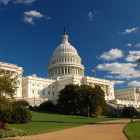
Ideas for State Advisory Groups in New Report From CJJ
|
Best practices for state advisory groups as federal grant money has diminished is the focus of a new report from the Coalition for Juvenile Justice.
Juvenile Justice Information Exchange (https://jjie.org/tag/federal-funding/)

Best practices for state advisory groups as federal grant money has diminished is the focus of a new report from the Coalition for Juvenile Justice.

In a replay of last year, President Donald Trump proposed scrapping the 21st Century Community Learning Centers initiative, the federal funding for after-school and summer learning that reaches 1.7 million children.

Tuesday is President Donald Trump’s first State of the Union address. As he prepares to address the nation and outline his priorities for the year, we thought it fruitful to write our own State of Youth Justice address.

Federal funding for state and local juvenile justice programs seems likely to take another big hit as Congress continues to slash federal "discretionary" spending. The Republican-controlled House committee that appropriates money for the Justice Department today issued its proposal for the fiscal year starting Oct. 1. It would cut juvenile justice funding to $209 million--a figure that stood at $424 million in fiscal year 2010. Federal aid for juvenile justice already had fallen more than 50 percent to its lowest level in more than a decade, says the Coalition for Juvenile Justice, which represents state advisory committees in Washington, D.C. The coalition is asking Congress for $80 million for "formula grants" that helps states comply with mandates in a key 1974 juvenile crime law, such as separating juvenile and adult defendants in jail and keeping minor offenders out of custody.

Georgia will lose $27 million for Head Start, a comprehensive early childhood development program for at-risk children, if the proposed U.S. House budget bill is signed into law, according to a new report by the Georgia Budget and Policy Institute. The cut represents 3,900 seats in the program. The 878,000 low-income kids enrolled in Education for the Disadvantaged programs across Georgia will also lose big. Those programs will face a $40 million reduction in federal funds. Some programs will lose federal funds altogether. YouthBuild, a program that gives construction jobs and education to disadvantaged teens is zeroed out in the proposed bill.

Children’s programs funded by the federal government may be cut if evidence based data does not prove they are successful. Youth Today looks at the dilemma facing well established programs such as Outward Bound and Teach for America because of new funding rules. Just because a program has a positive public image does not mean it will get money in the 2011 fiscal year budget. Juvenile justice programs that provide alternatives to prison could be at risk without evidence based data. Non-profit agencies that depend on federal funding are now scrambling for congressional support and some are arguing that evidence based data may not be the most accurate way to evaluate their work.